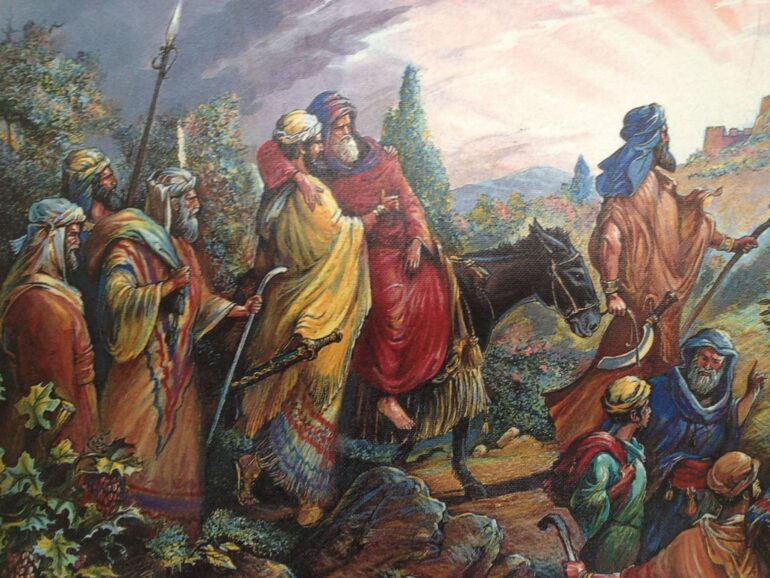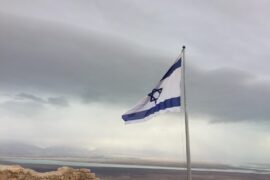Parshat Ḥukat brings us to the last year of Israel’s forty year desert journey. While the first half of Sefer Bamidbar highlights Israel’s tribal formation and a series of crises that help a former slave population develop into a nation, the second half focuses on the next generation’s military and cultural conflicts on the international stage.
While the generation that left Egypt experienced a world of obvious open miracles, the desert generation had to learn to function in a more natural world in anticipation of the campaign to conquer Eretz Yisrael. But as the preparations for the coming war began, Israel was attacked by an unexpected foe.
“The Canaanite king of Arad, who dwelled in the south, heard that Israel had come by the route of the spies, and he warred against Israel and took a captive from it. Israel made a vow to HaShem and said, ‘If You will deliver this people into my hand, I will consecrate their cities.’ HaShem heard the voice of Israel, and He delivered the Canaanite, and it consecrated them and their cities. It named the place Ḥormah.” (Bamidbar 21:1-3)
Rashi teaches that the captive abducted from Israel was actually a female slave taken from the Canaanites during a previous battle. That the entire Hebrew nation mobilized to rescue the captive indicates the appropriate response to even the slightest provocation. By permitting an enemy to take even a slave girl, Israel would be displaying weakness and inviting further aggression. But by responding with maximum force, the Hebrews sent a clear message strong enough to discourage future attacks.
Amalek in Parshat Ḥukat
Rashi further clarifies that the king of Arad was actually not a Canaanite. Rather, he and his soldiers were descendants of Amalek – a people committed to eternal war against Israel. The Amalekites disguised themselves by speaking in a Canaanite tongue, revealing a central feature of Amalekite propaganda.
While the Amalekite hatred of Israel is an ideological hatred that aspires to genocide and isn’t dependent on any external factor, the Canaanite hostility towards Israel was different. The Hebrew tribes were coming to conquer a country that had at that time been ruled by a confederation of Canaanite warlords. Therefore, the Canaanite problem with Israel was based on a dispute over territory while Amalekite hostility stems from a much deeper compulsion to remove Israel from the world.
By speaking in the language of Canaanites, Amalek hoped to give the impression that its war was based on a territorial dispute rather than on a desire to eradicate the children of Israel.
In order to neutralize such propaganda, Israel requires strong and articulate leaders who possess not only an unbreakable commitment to the historic Jewish mission, but also an appreciation for the necessity of clearly communicating the struggle to complete it in a language others can understand.
The Value of Effective Communication
While the Hebrew mission requires Israel to possess self-determination in our entire country, our official representatives have on the whole proven incapable of successfully communicating this. And while dedicated activists firmly committed and ready to sacrifice for the Jewish mission have largely disdained efforts to explain our struggle to the outside world as a sign of inner weakness, those who understand the importance of successful communication are for the most part apprehensive about championing our people’s actual aspirations – opting instead for flimsy talking points aimed at branding Israel as a westernized American client state seeking to win gentile approval through a professed willingness to surrender portions of our land.
Israel needs leaders who both appreciate the importance of public relations and are unwilling to compromise on our national mission. Leaders internally connected to our people’s deepest yearnings yet capable of communicating those aspirations in a language comprehensible to the outside world.
While situations might exist in which diplomacy is inappropriate, there is generally great value in properly communicating the justice of the Hebrew liberation struggle. And far from being a symptom of weakness, giving voice to the Jewish people’s deepest aspirations can often serve to strengthen Israel’s position on the battlefield. In fact, some of Jewish history’s most valiant warriors provide us with clear examples of proper “Israel advocacy.”
An Example from Parshat Ḥukat’s Haftara
In Parshat Ḥukat‘s Haftara, Yiftaḥ defends Israel’s right to territory east of the Jordan River that the Hebrews had won from the Amorites (Bamidbar 21:23-26) against claims by the king of Ammon that those lands rightfully belong to Moav (who had previously lost the territory to the Amorites).
“Yiftaḥ sent emissaries to the king of the children of Ammon saying, ‘What is unto you and unto me that you have come to me to make war in my land?’
The king of the children of Ammon said to Yiftaḥ’s emissaries, ‘Because Israel took my land when it ascended from Egypt, from Arnon until the Yabbok until the Jordan, so now return them in peace.’
And Yiftaḥ once again sent emissaries to the king of the children of Ammon.
He said to him, ‘Thus said Yiftaḥ: Israel did not take the land of Moav and the land of the children of Ammon… It went through the wilderness, and went around the land of Edom and the land of Moav and came to the eastern side of the land of Moav where they encamped across the Arnon; but they did not enter the border of Moav, for Arnon is the border of Moav. Then Israel sent emissaries to Siḥon king of the Amorite, king of Ḥeshbon, and Israel said to him, ‘Let us please pass through your land until my place.’ But Siḥon did not trust Israel to pass through his border, rather Siḥon assembled all his people and they encamped in Yahatz; and he made war against Israel. Then HaShem, G-D of Israel, delivered Siḥon and all his people into the hand of Israel, and He struck them; and Israel took possession of the entire land of the Amorite, the inhabitant of that land.’
‘They took of the entire border of the Amorite, from Arnon to the Yabbok, and from the wilderness to the Jordan. And now HaShem, G-d of Israel, has driven out the Amorite from before His people Israel, and you would possess it? Do you not take into your possession that which your god Kemosh bequeaths to you? – that may you possess; but all that HaShem our G-D drives out from before us, we shall take possession of it. And now, are you much better than Balak son of Tzipor, king of Moav? – did he ever strive against Israel? – Did he ever do battle with them? When Israel dwelled in Ḥeshbon and its villages and in Aroer and its villages and in all the cities that are alongside Arnon for three hundred years, why did you not recover them during that time? I have not sinned against you; but you do me wrong to make war against me; may HaShem the Judge judge today between the children of Israel and the children of Ammon.’” (Shoftim 11:12-27)
Without betraying Israel’s national claims or values, Yiftaḥ made the effort to explain his position and offer peace to Ammon while simultaneously expressing confidence and a willingness to fight for the disputed lands. The Ammonite king refused to heed Yiftaḥ’s warning.
“Then Yiftaḥ passed through to the children of Ammon to do battle against them, and HaShem delivered them into his hand. And he struck them from Aroer until you come to Minit, twenty cities, until the Plain of Kramim, a very great slaughter; and the children of Ammon were subdued before the Children of Israel.” (Shoftim 11:32-33)
A Maccabean Approach
A similar approach was taken by the Hasmonean leader Shimon HaTasi – brother of Yehuda Maccabi and last surviving son of the Adon Matityahu – when the Seleucid Greek King Antiochus VIII Grypus attempted to pressure Israel into surrendering territory.
“He (Antiochus) sent Athenobius, one of his friends, to him (Shimon) to deal with him, saying, ‘You have in your possession Jaffa and Gezer and the citadel in Jerusalem, cities of my kingdom. You have laid waste their borders, and played great havoc in the land. You have taken possession of many places in my kingdom. Now, then, hand over these cities that you have taken, and the tribute of the places outside the borders of Judea that you have appropriated. If you refuse, then give me instead five hundred talents of silver; for the damage that you have done and for the tribute of the cities, another five hundred talents. Unless you do this, we will come and make war on you.’” (Maccabim I 15:28-31)
“Shimon replied, ‘We have neither taken foreign land, nor do we hold dominion over other people’s territory, but only over the inheritance of our fathers, from which we were unjustly banished by our enemies. And now we have seized the opportunity to return and hold the inheritance of our fathers.’” (Maccabim I 15:33-34)
The Seleucid Greek military subsequently invaded the land of Israel but was defeated by Judean fighters led by Shimon’s courageous sons. The Hasmonean leader’s firm response to the threats of Antiochus not only clarified Israel’s position to the enemy but also inspired Hebrew fighters with a conscious awareness and unbreakable certainty in the justice of their cause. Proper political messaging therefore not only serves to present our case to the nations but also strengthens us internally with inner fortitude and a willingness to fight.
To refrain from educating the outside world to the justice of our cause is not only a transgression against historic Jewish aspirations but also a disservice to all those righteous gentiles who genuinely care about fighting injustice and would likely champion our cause if given the chance to recognize the inherent justice of our struggle.
A central component of the Jewish mission in this world is to bring all Creation to the awareness of HaShem as the one and only absolute Reality that creates, sustains and affectionately empowers all that exists. And a primary step in achieving this lofty goal is connecting people to the story of the Hebrew nation.
As the national expression of HaShem’s Ideal in this world, Israel is the leading protagonist of human history. The more we succeed in connecting people to our story, the closer we bring them to the Kadosh Barukh Hu. By helping mankind to recognize and identify with Israel’s national aspirations and with the challenges we still face on the road to full redemption, we are actively participating in working towards Creation’s ultimate goal by means of leading mankind to a state of higher consciousness and bringing all existence to ultimate perfection.





